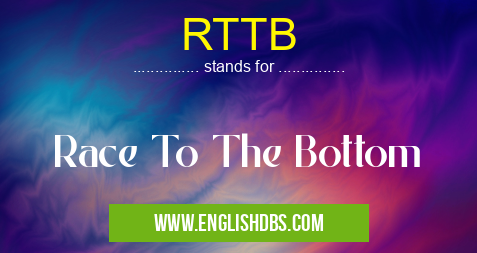What does RTTB mean in INTERNATIONAL BUSINESS
In business, RTTB stands for Race to the Bottom. It is a phrase used to describe a situation in which businesses compete with one another and take increasingly aggressive steps to drive down prices and production costs in order to gain an advantage over their competitors. The result of this competition is often lower quality products, reduced wages, and decreased innovation.

RTTB meaning in International Business in Business
RTTB mostly used in an acronym International Business in Category Business that means Race To The Bottom
Shorthand: RTTB,
Full Form: Race To The Bottom
For more information of "Race To The Bottom", see the section below.
Definition of RTTB
RTTB describes a business strategy in which companies compete with each other by continually reducing prices or production costs in order to gain an advantage over their rivals. This downward spiral can lead to lower wages, lower quality products, and decreased innovation. Furthermore, it can cause corporations to underinvest in research and development as they try to remain competitive on price-driven models instead of a higher value-added model.
Impact of RTTB
The most immediate impact of RTTB is on wages as companies reduce labor costs wherever possible. In addition, there may be decreased spending on research and development as well as product quality controls, resulting in inferior goods ultimately being sold at cheaper prices than better-made alternatives. Finally, RTTB can deter long-term investment from companies who see no point in investing in new technologies or processes if competitors simply undercut them after acquiring the new technology or process themselves.
Essential Questions and Answers on Race To The Bottom in "BUSINESS»INTBUSINESS"
What is Race to the Bottom?
Race to the Bottom is an economic concept that refers to a self-destructive competition between companies or countries seeking competitive advantage by driving down wages, labor standards, and environmental protection in order to increase their profit margins.
How does it usually manifest itself?
It can take several forms such as outsourcing jobs abroad for lower wage rates, cutting taxes and regulations in order to attract businesses, engaging in price wars, or working long hours for low pay.
Who is generally hurt by this type of competition?
This kind of competition usually affects workers who are unprotected against exploitation due to their lack of unionization or other employment protections. It can also harm consumers because products produced under exploitative conditions may have poor quality.
Are there any negative effects on the environment?
Yes, Race To The Bottom encourages companies to relax environmental regulations in order to reduce operating costs and compete for market share. This could lead to reduced air and water quality due to pollution, increased emissions of greenhouse gases linked with climate change, and more resources being consumed than are necessary.
What industries are most affected by it?
Industries such as manufacturing and agriculture are typically targets of Race To The Bottom tactics due to their higher propensity for unregulated labor practices or disregard toward environmental impact. However, even those in seemingly less vulnerable sectors such as technology or finance can be exploited if certain laws or industry standards are weakened through strategic lobbying efforts.
What measures could be taken by governments to protect citizens from exploitation caused by this phenomenon?
Governments should set higher minimum wage requirements for its citizens, monitor foreign investment laws so that companies do not abuse cheaper labor abroad while selling products locally at a much higher cost, enforce stricter regulations on businesses when it comes to environmental protection standards, protect worker rights including unions and collective bargaining agreements, and incentivize responsible business practices through tax benefits and grants.
Is Race To The Bottom limited only within countries borders?
No! Globalization has enabled companies to look beyond national borders for cheaper labor alternatives and markets with fewer restrictions which could lead them into a race towards the bottom all around the world without regard for local cultures or laws. As global trade increases without proper oversight on labor practices there will be an inevitable downward pressure on wages across geographic boundaries leading into a race towards lower pay rates universally.
Final Words:
In conclusion, RTTB is a business strategy utilized by companies when attempting to gain an edge against their rivals through the reduction of prices or production costs that has adverse effects such as lower wages and quality products being produced. While this strategy may work well during times of weak economic conditions where demand is low; it must be managed carefully so that it does not become detrimental both economically but also ethically.
